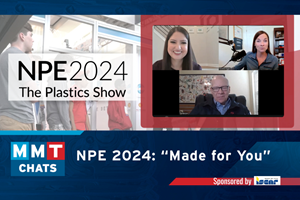Kennametal Takes Leadership Role Supporting MTConnect® and ISO 13399
Emerging standards for sharing tool and machine data will help firms large and small improve efficiencies and increase capabilities.
As conferences go, it was not a record-breaker in terms of attendance. Nor were the announcements awaited with the same worldwide frenzy given the latest smart phone iteration or social media destination. Yet the recent 2013 MTConnect Connecting Manufacturing Conference was instrumental in further preparing the foundation of a monumental change in how manufacturing firms can obtain, manage, and share their machine tool and tooling data. As increasing manufacturing efficiencies and productivity are primary goals of MTConnect, Kennametal has supported and was among the industry leaders presenting how these standards can work now and how shops can use them to their benefit.
As recently as 2010, manufacturing industry research stated that about four or five percent of machine tools worldwide were connected to a formal data-collection system. Each and every shop sits on a rich mine of data that it can collect for its own continued improvement, but a significant drawback is efficiently gathering the data from different makes and models of machines and tools. This has been likened to a permanently ongoing United Nations meeting with no translators.
The idea for an open shop floor standard for making all shop floor data easily accessible and workable was conceived in 2006 by the Association For Manufacturing Technology (AMT) with the first version of MTConnect released in 2008. Then, in 2009, the MTConnect Institute, a not-for-profit 501(c)(6) organization, was established to further the development of the MTConnect standard and publish related materials. The organization includes a Board of Directors, a Technical Advisory Group (MTCTAG), a Technical Steering Committee, and various working groups to further the standard in specific technology areas.
Basically, MTConnect is an open, extensible, royalty-free standard – a communications protocol designed specifically for the shop-floor environment. By interfacing with machine tools, cutting tools, presetters or any piece of equipment or data source, software applications can be built on MTConnect standard for the efficient gathering, reporting, and use of a shop’s data.
Cutting tools can be an extremely valuable data source for shops to monitor, collect, and study, says Tom Muller, senior manager, Innovation Ventures Group, at Kennametal Inc. He chairs the MTConnect Institute’s working group on cutting tools and reported to the conference on ISO 13399 – Cutting Tool Data Representation and Exchange. Noting that MTConnect is a protocol and that ISO 13399 is an international standard, Muller demonstrated that MTConnect does not have to go into the standards development business. Since ISO 13399 already defines and standardizes such cutting tool attributes as cutting diameter, edge angle, body diameter, overall length, functional length, and functional width, among many others, MTConnect can simply adopt the ISO 13399 definitions and achieve a consistent language for exchanging data between machine tools, tool data management systems, presetters, and even CAD/CAM systems. Shops can literally monitor a customer’s project from art to part, efficiently gathering data from every step.
“The more we can drive the standardization of cutting tool data, the simpler and more efficient we can make a shop’s business,” Muller said. Imagine not only staying on top of the volumes of data a shop produces, but having machine tools “know” what the presetter and the cutters “know” through the efficient exchange of data. Hours of setup, touch-offs, and test cutting could become a thing of the disorganized past. Tribal knowledge or “how Joe does it” can make way for organized and systematized ways of manufacturing parts. MTConnect is in place, and the applications from the machine tool, tooling technology, and software leaders are coming.
Related Content
MMT Chats: A More Modern NPE “Made for You”
The Plastics Industry Association is making NPE 2024 a “can’t miss”’ experience with more of everything – education, exhibitors and networking! The PLASTICS Industry Association Chief Operating Officer Glenn Anderson and Director of Trade Show Marketing Damaris Piraino share what’s in store for attendees of next year’s May 6-10, 2024 in Orlando, Florida.
Read MoreU.S. Economic Fundamentals Impacting Moldmaking
The economy continues to downshift, capping growth in moldmaking.
Read MoreShift in U.S. Mold Imports: Emerging Countries Gain Ground in Market Share
The dynamic nature of the U.S. mold industry's global trade landscape offers challenges and opportunities for growth.
Read MoreTop 10 Topics to Cover During an ISO 9001 Manufacturing Audit
Take a look at this practical hands-on approach to conducting a quality audit.
Read MoreRead Next
Are You a Moldmaker Considering 3D Printing? Consider the 3D Printing Workshop at NPE2024
Presentations will cover 3D printing for mold tooling, material innovation, product development, bridge production and full-scale, high-volume additive manufacturing.
Read MoreReasons to Use Fiber Lasers for Mold Cleaning
Fiber lasers offer a simplicity, speed, control and portability, minimizing mold cleaning risks.
Read MoreHow to Use Continuing Education to Remain Competitive in Moldmaking
Continued training helps moldmakers make tooling decisions and properly use the latest cutting tool to efficiently machine high-quality molds.
Read More.jpg;maxWidth=970;quality=90)






.jpg;maxWidth=300;quality=90)












